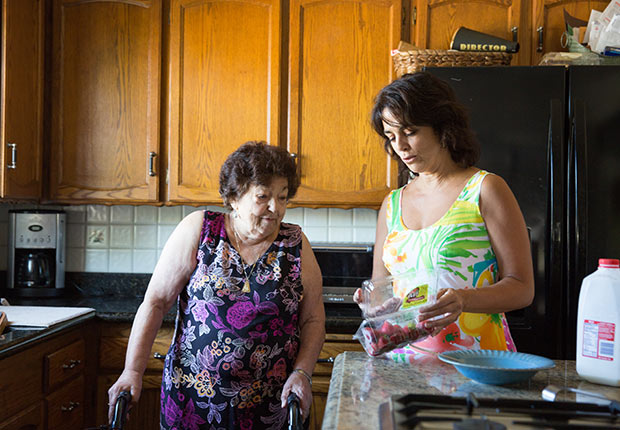AARP Hearing Center

By Ray Huard
About four years ago, Antoinette Alioto’s 86-year-old father was diagnosed with terminal lung cancer. Weeks later, her mother, 82, suffered two strokes.
Suddenly, Alioto, a single mother of four children in San Diego, was faced with becoming an almost full-time caregiver while trying to get a small business teaching cooking classes off the ground.
Her three sisters helped, but Alioto, 50, said she became the primary caregiver. “It was pretty much around the clock,” Alioto said. “My mom was pretty bad. I think that was on account of seeing what my dad was going through.”
Alioto gave up her business and moved in with her parents. Alioto’s father died two years ago. With her sisters’ help, she still cares for her mother. Alioto has three children at home, ages 11 to 18, and goes to college full time.
“There’s so much to navigate. You go, ‘Well, I’ll just handle it the best I can.’ It takes so much time and energy,” Alioto said.
Finally, Alioto turned to the Southern Caregiver Resource Center in San Diego, one of 11 such centers in California. Staffers helped find resources for her mother, gave Alioto emotional support and asked an unexpected question: What do you need?
“In order to take care of that family member, you have to take care of yourself,” said Lorie Van Tilburg, executive director of the center.
But resources for family caregivers in California, from adult day care to getting in-home help, are spotty at best and don’t exist in some rural areas, according to agencies that help caregivers.
At the depth of the recession five years ago, state funding for the resource centers was cut from about $12 million to about $2.9 million. It hasn’t been restored, said Vicki Farrell, director of the Association of California Caregiver Resource Centers ( cacrc.org), the network of centers around the state.
Finding new funds
A drive to restore some of that funding failed in the Legislature this year. To compensate for the cuts, Van Tilburg cobbles together grants, corporate donations and fundraising projects.
Although services in general are better in urban areas, even getting them there can be challenging.
In Sacramento, for example, there’s a serious shortage of adult day care centers, said Lydia Missaelides, executive director of the California Association for Adult Day Services.
Nancy McMahon, 61, of Carlsbad, was able to find help for herself and her husband, Tom, 63, through local churches and support groups, the Alzheimer’s Association and the Shiley-Marcos Alzheimer’s Disease Research Center at the University of California, San Diego.
“The people who come [to support groups] are a wealth of information,” she said.
Three years ago, Tom was diagnosed with Alzheimer’s disease. A second diagnosis showed he also had frontotemporal degeneration, a form of dementia characterized by a gradual, progressive decline in behavior and/or language.
Officials at several agencies that work with caregivers point to help online, with several websites listing resources, including the California Department of Aging ( aging.ca.gov) and the Family Caregiver Alliance ( caregiver.org).
The AARP Caregiving Resource Center has information on benefits, insurance and locating resources, as well as tips for caregivers. Go to aarp.org/caregiving or call 877-333-5885 toll-free. You can also share your caregiving story at aarp.org/iheartcaregivers.
Ellen Opie, 50, a nurse practitioner in San Francisco, said she was at a loss when it came to finding assistance with caring for her 81-year-old mother, who has dementia. She received help from the Family Caregiver Alliance.
“One of the most important things they helped us with was educating us about the disease. They just held our hands throughout this whole process,” Opie said. “Just having them be our support, that was care for me.”
Ray Huard is a writer living in San Diego































































